- 15 Benefits of AI in Recruitment/Talent Acquisition - December 19, 2025
- Is Performative Inclusion Hurting Your Talent Pipeline? - December 9, 2025
- Is The Lack of Career Growth Losing You Valuable Hires? - November 20, 2025
AI in recruitment continues to grow. The relationship makes logical sense, as recruiters and employers continuously use AI for its scalability and accuracy. These solutions resolve bureaucratic complexities that have caused countless headaches by replacing repetitive tasks with sleek data-based automation.
While the tech itself seems self-explanatory (where the word automation keeps reappearing), it helps hiring teams if they know more about AI before adopting the right tools and approaches.
According to the World Economic Forum, trends indicate that the enterprise sector of AI recruitment could grow at a CAGR of 6.17% between 2023 and 2030. So perhaps now could be a pivotal moment for hiring experts to get better acquainted with AI recruitment and get ahead of the curve!
As you probably know, Ongig constantly challenges traditional methods to enhance the candidate experience. We believe that AI helps with hiring the best talent. So, this includes anything from writing job postings to improving workflows and seamlessly managing other HR tasks.
To that end, we did some digging to shortlist 13 books on AI in recruitment that have caught our attention. These pageturners cover the multi-faceted (and fascinating) developments in AI recruitment, the mechanics behind the magic, and its effect on attracting the right candidates.
Whether you’re a veteran enterprise recruiter or a new manager who wishes to experiment with campaign ideas, you’ll find great value in the following titles.
#1 – AI in Talent Development: Capitalize on the AI Revolution to Transform the Way You Work, Learn, and Live by Margie Meacham
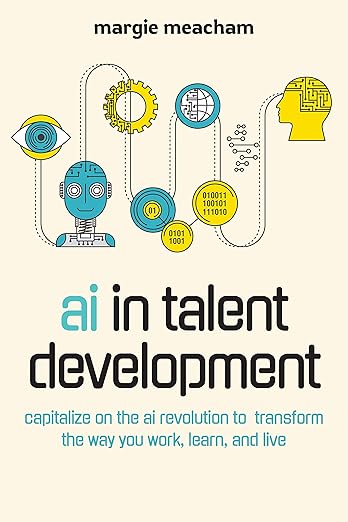
Adult learning expert Margie Meacham provides an engaging insight into AI’s role in transforming the way we develop our abilities. Specifically, Margie shines a torch on a topic that’s constantly on the mind of every AI user: transparency. AI Talent Development spans diverse talent-related issues in this area, from everyday living to how we hire and thrive at work.
Key points: The book equips HR managers (which also benefits talent acquisition teams) with emerging information on AI’s risks, benefits, and use cases. Margie makes the topic accessible. Thus, showcasing how AI integration can simplify complex work processes, such as handling a gazillion chatbot queries.
One major highlight of the book lies in uncovering the black box of AI (i.e., the unknown and inaccessible depths of AI knowledge). So, this is done to provide much-needed understanding and relief as you leverage AI to ramp up your workflow.
#2 – AI Revolution in HRM: The New Scorecard by Ashwani Kumar Upadhyay, Jayanthi Iyengar, and Komal Khandelwal
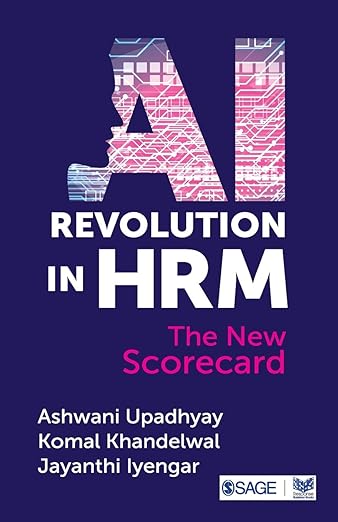
The authors of this practical human resource handbook debunk some popular myths about AI integration in the office. AI Revolution in HRM cheekily opens with the first chapter, “Employee Experience Gets an Intelligent Upgrade”. This discusses how automation speeds things up while minimizing conventional errors.
Chapter three of the book carries much value for TA experts as it examines modern-day recruitment demands. The book explains how AI makes it a cinch to navigate volatile job market trends and serves as the new scorecard for gauging the efficacies of hiring campaigns.
Key points: The book provides a plethora of rich anecdotes and fun analogies that enable absolute AI beginners to understand the technology’s impact and benefits on human resource decisions. Chapters in the book dive into the hot topics associated with AI implementation, which include inherent biases and data privacy woes.
#3 – The Algorithm: How AI Decides Who Gets Hired, Monitored, Promoted, and Fired and Why We Need to Fight Back Now By Hilke Schellmann
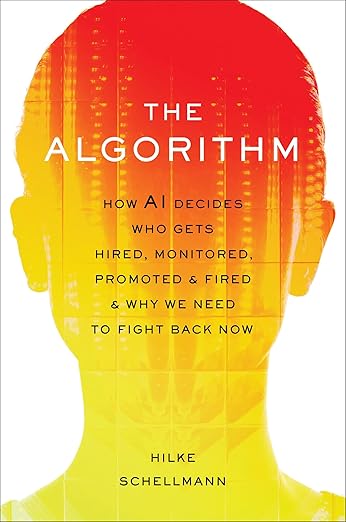
We decided to ensure that our list of book recommendations welcomes both sides of the AI debate. So, you gain a comprehensive understanding of the technology.
The Algorithm focuses on the less popular subtopics of AI in hiring and recruitment. The subtle biases and prejudices perpetuated by faulty training data. After all, any subject involving personal information and one’s livelihood requires deep contemplation.
Key points: Author Hilke Schellmann invites readers to explore the complexities of algorithms via an enthralling detective-journalism POV. By flipping through the pages, you can expect to learn more about the experience of job applicants subjected to novel/experimental AI recruitment techniques.
These include the pervasive use of employee tracking tools (e.g., recording facial expressions) and personality profiles tagged to online candidate information. It also includes AI-based video games used in hiring. In a nutshell, it’s an adventurous narrative that reveals the good, bad, and ugly of AI implementation in talent management.
#4 – Career AI: Navigating the Job Market in the Age of Artificial Intelligence by Michael R. Watson
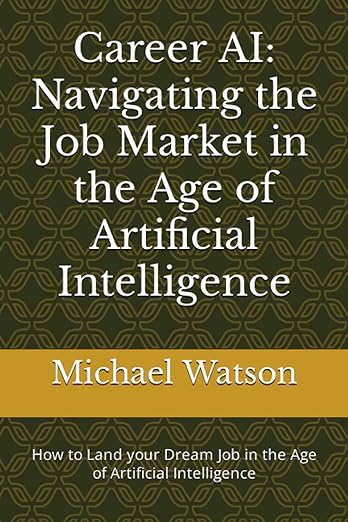
HR and talent acquisition specialist Michael R. Watson shares keen observations from over 20 years of experience in the field. Michael sheds light on AI’s impact on talent. So, this includes personal branding in the digital age and new jobs realized by the emerging technology.
Key points: Michael deftly showcases the contrast between conventional talent management and the rise of AI as a catalyst. The author highlights rich perspectives from conservative beginnings raised by military parents and a later adaptivity toward ever-present career and life opportunities.
Readers are treated to the steps taken to familiarize themselves with and prepare for the AI landscape of tomorrow. Michael’s long-term position in an intelligent talent solution company yields exclusive information on how the biggest enterprises use AI technology to target, employ, and retain their best talent.
#5 – Demystifying AI for the Enterprise: A Playbook for Business Value and Digital Transformation by Prashant Natarajan et al.
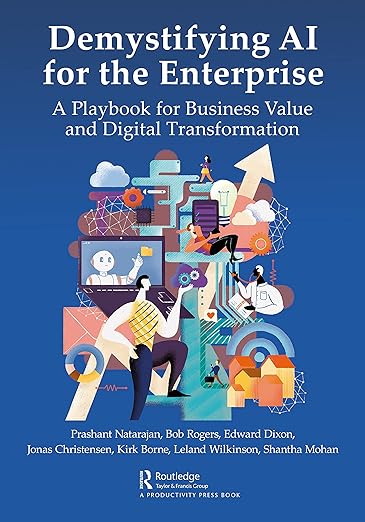
Looking for a definitive playbook on AI for enterprises. Then, look no further than this primer, which spans the technology’s definitions, applications, and challenges. The book’s academic team of writers spared no expense in collating AI’s impact on diverse industries. It also explores how you can better prepare your hiring teams to manage the overwhelming data for the best organizational outcomes.
Key points: The book presents an exhaustive reference for guiding your company’s digital transformation by maximizing business value through AI conveniences. These insights extend to recruiters and hiring managers tasked with scaling their talent acquisition campaigns in the most challenging job markets.
#6 – THE AI RECRUITER: Revolutionizing Hiring with Advanced GPT-Powered Prompts by Mike Wolford
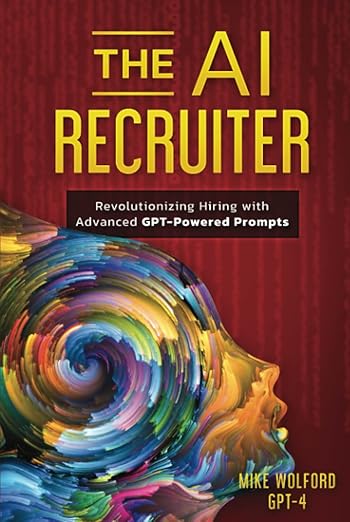
AI and recruiting expert Mike Wolford explains the steps to implementing AI recruitment tools. Specifically, the author explores GPT-based prompts through real-world applications. The book offers firsthand accounts of the effectiveness of GPT-based processes. So, this includes precautionary tales of AI hallucination and its massive impact on hiring decisions.
Key points: Unlike some entries on our list that focus on AI theories and analogies, this book is packed with practical exercises. You can quickly apply these exercises to your hiring and recruitment initiatives.
The book dives into OpenAI’s GPT and GPT-4 (the most advanced version of the AI training model, characterized by more comprehensive parameters for streamlined search results) as applied by modern recruiters. Essentially, The AI Recruiter reveals the limitations and strengths of the GPT model and its growing influence in connecting with top talent.
#7 – Artificial Intelligence for Business: An Implementation Guide Containing Practical and Industry-Specific Case Studies by Hemachandran K, Raul V. Rodriguez
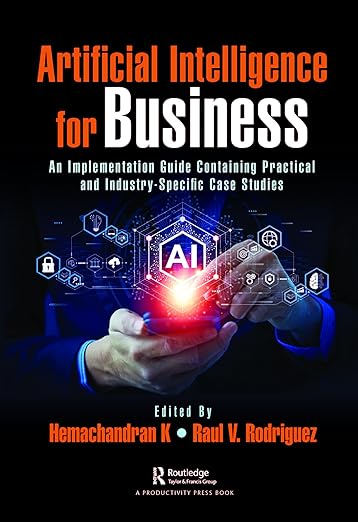
Artificial Intelligence for Business provides a holistic view of AI’s role in the business landscape across different real-world use cases. Browsing through the pages lets you peer into fascinating AI applications, including industry-specific examples for practical case studies. Aside from supporting businesses, the book also provides insights into how AI impacts the world at large. This is explored from transportation to sports performance analytics (e.g., the metrics on what drives athletes to outperform the competition).
Key points: Artificial Intelligence for Business covers talent management and recruitment topics. It also includes exclusive commentary from business experts who have “been there and done that” with AI. One essential part of the book (as far as talent acquisition goes) explores the ethical considerations of AI and how companies can ensure the best practices for compliance and improved outcomes.
#8 – Human + Machine, Updated and Expanded: Reimagining Work in the Age of AI by Paul R. Daugherty and H. James Wilson
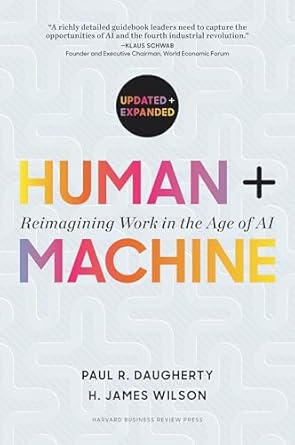
Written by consulting giant Accenture’s tech leaders Paul Daugherty and James Wilson, Human + Machine reviews the capabilities of generative AI. It also explores how companies can leverage their dynamic functions to get ahead of competitors. The book is an information-rich read as it unpacks the authors’ experience collaborating with over 1500 organizations.
Key points: The book outlines how AI continues to shape the workforce by condensing complex notions into accessible examples and analogies. Readers can look forward to learning more about the framework involved in integrating AI into their workforce’s roles and responsibilities, including hiring and recruiting processes. One major takeaway from this book is how AI solutions augment workplace practices, combining human expertise with AI consistency for maximum proficiencies.
#9 – The AI Playbook: Mastering the Rare Art of Machine Learning by Eric Siegel
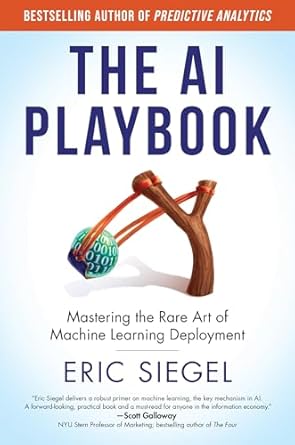
Machine learning expert Eric Siegel delivers this expertly crafted primer in a six-step framework that anybody can apply to their practices. These steps include creating a deployment goal, predicting the solution’s workability, and training the model with relevant business inputs.
Despite its seemingly abstruse premise, the author shares the information with accessible language understood by non-technical folks interested in harnessing the power of machine learning.
Key points: The book addresses core ML terms that have reshaped recruitment. These include predictive analytics models forecasting the most effective job channels. Eric dives into the practical aspects of machine learning. He also explores how companies can integrate AI into various business areas, including talent acquisition initiatives. The author also shares techniques for pitching machine learning campaigns to top management with proven success stories.
#10 – Introducing HR Analytics with Machine Learning: Empowering Practitioners, Psychologists, and Organizations by Christoper M. Rosett and Austin Hagerty
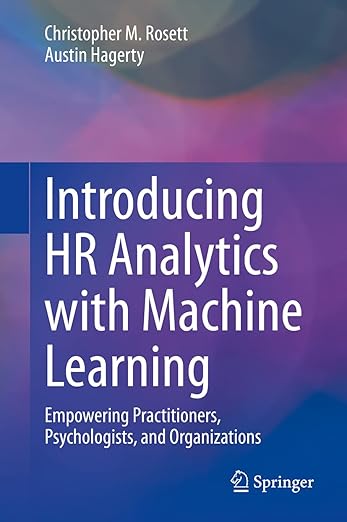
All forms of organizational AI correlate to the company’s human capital strategy. So, these include deploying automated solutions (like Ongig’s Text Analyzer) for standardizing and scaling recruitment efforts. Introducing HR Analytics with Machine Learning reveals the intimate details behind machine learning in HR intelligence and AI tools.
Key points: The author systematically unpacks the behavioral data, research methods, data systems, and statistics involved in HR analytics. From an organizational perspective, the book clarifies the skills and best practices that teams need to maximize the use of their workforce data. This concerns boosting a company’s quality of hire with AI recruiting tools.
You could infer the book’s practicality from its aptly phrased chapters, such as HR Analytics Ikigai (the Japanese term that translates as the reason for being), Great Results Come from Great Questions, and What History Can Teach Us About Using Machine Learning Well.
#11 – Humanity Driven AI: Productivity, Well-being, Sustainability and Partnership by Fang Chen and Jianlong Zhou
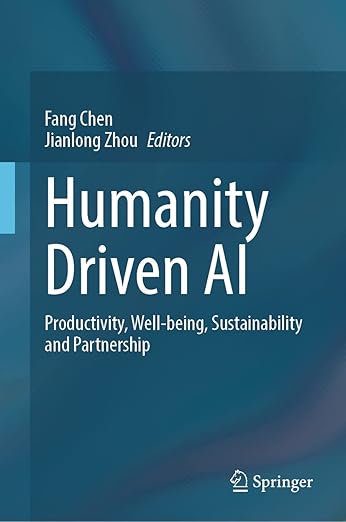
Here is a 330-page treasure trove of knowledge recommended for those interested in understanding AI’s multifarious functionalities. The detailed write-up documents AI’s impact on society through its practices, methodologies, and theories.
Key points: Although better suited for an AI enthusiast, the book contains valuable insights into talent acquisition. This is mainly found in sections on AI and human partnerships, learner engagement, and AI application from the perspective of people with disabilities. The book also provides practical lessons on the benefits of AI that your team could apply in inclusive hiring and skills-based employment.
#12 – AI for the Sustainable Development Goals by Henrik Skaug Sætra
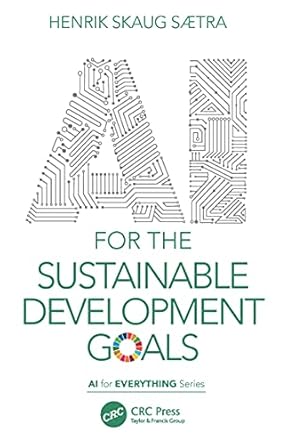
What is the link between the United Nations’ Sustainable Development Goals (SDGs) and AI? Philosopher and researcher of technology-based ethics Henrik Skaug Sætra explains in a riveting read that digs into the fabric of the data-driven technology. Thus, unearthing its purpose, origin, and profound impact on organizational sustainability.
Key points: Henrik’s masterful explanation of AI makes it easy to connect the dots between the AI algorithm and each SDG. The textbook illuminates how AI affects every SDG beyond the immediately obvious ones (like SDG 5 for gender equality and SDG 10 for reduced inequalities). Companies have been paying more attention to sustainable practices as the world approaches the
Financing for Development Conference and World Social Summit in 2025. As such, investing in AI could lead to political and industry buy-ins for environmental, social, and governance (ESG) objectives.
#13 – The AI Advantage: How to Put the Artificial Intelligence Revolution to Work by Thomas H. Davenport
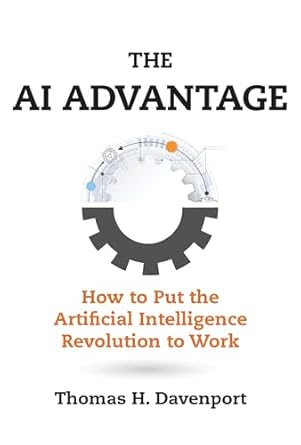
The AI Advantage is the oldest entry on our list (the first edition was published in 2019). But, its lessons remain relevant (if not more so) today. The book doesn’t focus on AI in the hiring and recruitment process, however. But, instead encourages readers to consider the entire business problem. Thomas dives into AI’s analytical prowess and how it expedites manual administrative tasks, engaging more people better than ever before at a fraction of the time it once took.
Key points: The book presents the mechanisms behind AI and backs up its knowledge with reports from big companies that have succeeded with the technology. You’ll also find informative snippets of reports from top enterprises like Google and Amazon. So, these case studies validate the winning combination of automation and the indispensable expertise of human recruiters.
Best Practices for Implementing AI in Recruitment
Using AI in recruitment can be a game-changer for finding the right talent efficiently. So, here’s a simple guide to help HR professionals and recruitment teams integrate AI in their hiring processes effectively.
1. Start with a Clear Plan to Implement AI in Recruitment
Before introducing AI in recruitment, HR teams must have a clear plan. So, determine what hiring processes you want AI to support. Will it screen candidates, schedule interviews, or help with job recommendations? Knowing the purpose for using AI in recruitment makes it easier to select the right tools.
2. Choose the Right Tools for Your Team’s Needs When Implementing AI in Recruitment
Every HR team has different needs. So, be sure to research AI recruitment software options that fit your company culture and goals. Therefore, look for tools like AI-powered chatbots for initial candidate interactions. Or, you can also find AI screening tools to filter through large amounts of data on potential candidates. Also, consider virtual assistants for time-consuming tasks like interview scheduling. Selecting the right AI systems can help save time and connect you with the most qualified candidates.
3. Use AI in Recruitment to Support, Not Replace, Human Interaction
AI can handle tasks like screening applications or providing data-driven insights, but human interaction remains crucial in building relationships. For example, conversational AI can respond to questions and make initial contact. However, HR professionals and hiring teams still need to assess if someone is a good fit for the company culture. So, balance the power of AI with the human touch for the best results.
4. Reduce Unconscious Bias by implementing AI in Recruitment
One of the greatest benefits of AI in recruitment is its ability to help reduce unconscious biases. AI algorithms are designed to make data-driven decisions based on historical data and specific skill sets, not on factors like age, gender, or background. However, it’s essential to monitor AI algorithms regularly to ensure fairness when selecting the top candidates for open positions.
5. Embrace Data-Driven Insights for Better Decision-Making with AI in Recruitment
AI recruitment solutions provide HR leaders with valuable data-driven insights. Recruitment teams can analyze candidate profiles and personality traits, allowing them to make strategic decisions about who might be the right people for specific roles. AI can also help predict which job candidates have the necessary skills and personality traits to become successful new employees.
6. Ensure that Using AI in Recruitment Enhances the Employer Brand
AI-powered tools can make the recruiting process smoother, which reflects positively on your employer brand. For example, an AI-powered chatbot that guides job candidates through the application process can create a seamless experience, while virtual assistants that schedule interviews at the right time help streamline the interview process. When used effectively, AI in recruitment strengthens your company’s reputation.
7. Optimize Timelines and Improve Efficiency with AI in Recruitment
The use of AI in recruitment can help reduce recruitment timelines by identifying the most qualified candidates faster. AI screening tools and AI recruiting software sort through large amounts of data to recommend the ideal candidate. So, HR professionals can then focus on nurturing relationships with the top candidates, saving valuable time.
8. Always Involve HR Leaders for Final Decisions
Though AI recruiting software can screen candidates and recommend the perfect candidate based on job applications, HR leaders should remain involved in making final decisions. Ultimately, a balance between AI and human judgment will ensure the hiring team selects candidates who fit both the skill set needed and the company’s values.
Why I Wrote This?
Ongig equips enterprise recruiting teams and hiring managers with an AI platform that creates effective and inclusive job postings. This allows you to diversify your talent pool and attract the most talented people, including passive candidates, for all job openings.
Our Text Analyzer platform also empowers your team to respond to the latest trends among job seekers, optimizing the candidate experience at scale. Request a demo with Ongig today to experience how AI can boost talent acquisition efforts by drawing the best candidates to your organization.
Shout-Outs
- World Economic Forum – Future of Jobs Report 2023
- By Glen Cathey – How ChatGPT Will Impact Recruiting and Hiring
- By Punnam Raju Manthena – Forbes – Artificial Intelligence In Talent Acquisition: How Machine Learning Is Influencing Recruitment
- United Nations – The Sustainable Development Goals Report 2024
- Dial Zara – AI Recruiting 2024: Complete Guide
